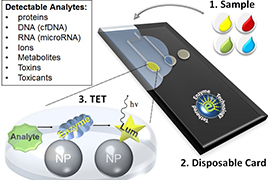Tethered Enzyme Technology

Baker Institute for Animal Health
235 Hungerford Hill Road
Ithaca, NY 14853
Phone: (607) 256-5618
rc338@cornell.edu
Developing enzyme-based biosensors for use in point of care testing technologies
Inspired by biomimicry, we devised a pioneering approach to harness the catalytic efficiency of enzymes for use in a rapid, low-cost and easy-to-use biosensor platform technology. Tethered enzyme technology (TET) overcomes the challenges associated with immobilization of enzymes on solid supports, enabling functionalization of nanoparticles with highly active bio-catalysts. These novel bio-functionalized materials can be utilized as biosensors, where the “solid state” catalytic reactions provide several advantages including the enzymatic reaction’s speed, signal amplification both at analyte detection and transduction into a readout, and high stability and long shelf life. Importantly, TET provides the means to detect and quantify multiple analyte classes within a single device, including proteins, enzymes, nucleic acids (DNA, RNA, microRNA), ions, metabolites, and toxins.
TET represents a unique platform technology with wide-ranging applications from diagnostic devices to energy generation. This technology addresses the growing need for rapid testing and near-patient medical monitoring and care. The high multiplexity of this technology allows us to “plug” into the microfluidic cartridge TET assays for different available and known biomarkers.
We are working on applications of this technology that will benefit human and veterinary patients alike, focusing on diagnosis of time-sensitive diseases (e.g. stroke or sepsis in humans and neurological disease in dogs), screening for early stage diseases (e.g. screen-tests for lung or breast cancers in humans and hemangiosarcoma in dogs), and disease monitoring (e.g. monitoring response to treatment, or disease progression and prognosis).



